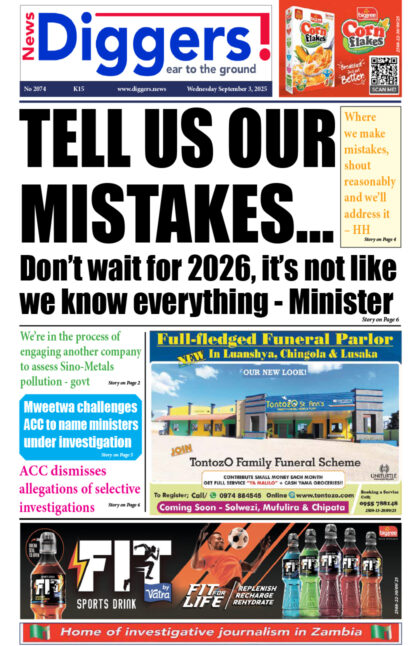Veteran politician Vernon Mwaanga says African regional organisations, including the Southern African Development Community (SADC), have failed to commit to the implementation of democratic norms and creating conditions for peace and stability on the continent.
Mwaanga observed that the absence of strong democracies, rule of law and human rights institutions had perpetuated insecurity, instability and violent conflicts across Africa.
He explained that political chaos had been on the increase in SADC member-states because the organisation has been passive instead of acting on democratic challenges.
“Sadly, SADC has been more passive, largely perhaps because we still have liberation political parties in power in many countries including; Tanzania, South Africa, Namibia, Zimbabwe, Mozambique, Angola etc. The current and endless political turmoil going on in Lesotho and DRC [Democratic Republic of Congo] bear testimony to this seeming indifference within SADC. It is evident that there has been a deterioration in democratic principles in SADC as space for opposition parties and an independent media has been rapidly shrinking. The so-called ‘new leaders’ have been clamping the democratic space as they tinker with constitutions and other laws to extend their stay in power. The region has often behaved like a neighbourhood that sees a fire starting in one of the houses on the same street, but do not call the fire brigade or render any form of neighbourliness – and only expressing their ‘shock’ after the house has been fully burned down, yet they were watching this fire with folded arms from the very onset,” Mwaanga lamented in an interview with News Diggers!
He said civil society across the continent was part of the “conspiracy of silence” in undermining Africa’s democratic space.
“Civil society has become part of the conspiracy of silence and some of them have become mere praise singers of those in power, in return for pieces of silver. Silencing and jailing those with different views has become the order of the day. Even speaking out against corruption has become an offence! The definition of corruption has also changed – it is only classified as corruption if it is perpetrated by political opponents, and completely invisible if committed by allies. Where is all this going to take the region in the absence of strong regional leadership like Nigeria in West Africa? The much-wanted and talked-about economic growth cannot be fully attained in an environment where levels of human dignity and democracy are declining. In such a context, those who choose to silently watch as human rights are being trampled on are as guilty as those who commit these atrocities. I pray that the repeated tears and cries of many of us will not be in vain,” Mwaanga added.
He recalled that regional organizations were originally established as gate-keepers of stability and peace in the respective regions of the continent.
“African regional organisations were established primarily to act as gate-keepers of stability, peace, economic development, democratic governance and to promote regional trade. The jury is still out as to whether they have lived up to the expectations of the people of Africa. The replacement of the OAU (Organization of African Unity) by the African Union (AU) in 2002 was a fundamental step towards regional cooperation, democratisation, conflict prevention and management. It was an important step towards the road to continental integration – including the thinking leading to an Africa’s own Criminal Court of Justice; a continental central bank and currency, and gave birth to the now-existing Pan African Parliament,” he said.
“Article 3 of the AU Constitutive Act stresses the need for collective efforts to promote democracy, peace, security, unity, good governance, economic and social advancement and prevent the overthrow of democratically elected governments by the military. These AU principles marked a major shift from the previous OAU policy of non-interference to the AU non-indifference and intervention. The AU comprehensive framework on democracy and constitutionalism called the African Charter on Democracy, Elections and Governance was then adopted in 2007 and enacted in 2012. The AU also adopted and established the Peace and Security Council and gave it power to impose sanctions against countries where there are unconstitutional changes of government.”
But he lamented that there has been a deterioration in democratic principles in the SADC region, and that space for opposition parties and an independent news media had shrunk as a result.
“The council then identified military coups and constitutional reversals, absence of strong democracies, rule of law and human rights institutions as the causes of insecurity, instability and violent conflicts in Africa. As a way of assisting member states to continue to improve their governance, the African Peer Review Mechanism has been a useful tool for many of the countries that have gone through it. As a consequence of all these decisions and others, regional institutions were created to promote the implementation of democratic norms and help create conditions for peace and stability on the African continent. These noble goals have in many instances been undermined by lack of commitment on the part of African leaders and buy-in by member states. We now have SADC, ECOWAS, IGAD, the Arab Maghreb Union, East African Community, Economic Community of Central African States, COMESA,” narrated Mwaanga.
“ECOWAS went further under the leadership of Nigeria, by adopting strong protocols on democratic values, human rights and the proactive intervention of truant member-states, which violate these principles. These include an independent Judiciary, free, fair and transparent elections, respect for human rights, freedom of association and space for a free and independent press. ECOWAS also set up a military intervention force under ECOMOG to deal with member-states that violate these principles with impunity. ECOWAS played a major role in bringing about relative peace in Liberia, Guinea Bissau, Guinea, Niger, Cote D’Ivoir, Burkina Faso and more recently in January 2017, in Gambia. Through its newfound determination, ECOWAS was able to reverse some military coups within its region firstly by not recognising them, and secondly by actual military intervention to enforce the reversals.”























